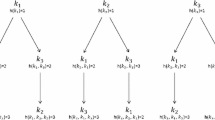Abstract
We study claims problems with indivisible goods. Due to indivisibilities, in certain situations, two agents with equal claims may have to receive unequal amounts. Our main goal is to find rules that deal with these situations in a consistent way. We propose three “systematic favorability” properties. We define a subfamily of up (down) rules studied in Moulin and Stong (Math Oper Res 27:1–30, 2002). We show that the subfamily are the only rules satisfying our first systematic favorability property, composition up, and bilateral consistency. Another family of rules we study are the sequential priority rules. Given a priority order over agents, we satisfy their claims one agent at a time until the resource runs out. These rules are the only ones that satisfy our second systematic favorability property, composition down, and bilateral consistency. Using duality, we also provide another characterization of the sequential priority rules, with our third systematic favorability property. Besides, we provide an alternative characterization of the rules studied in Herrero and Martinez (Soc Choice Welf 30:603–617, 2008).
Similar content being viewed by others
Notes
In claims problems with infinite divisibility, the random arrival rule is defined by taking average over all possible orders of agents. But it is not well-defined in this model.
I am indebted to an anonymous referee for advices on the model setting.
This property is defined by Herrero and Villar (2002) under the name of sustainability.
This property is defined by Herrero and Villar (2002) under the name of independence of residual claims.
In claims problems with infinite divisibility, the hypothesis is \(c_{i} \ge c_{j}\), and order preservation of awards implies equal treatment of equals. The property is modified for this model because equal treatment of equals is not feasible in the context of claims problems with indivisibilities.
The notation \(c_{-i} \in {\mathbb {Z}}_{+}^{N \setminus \{i\}}\) denotes the profile that results from deletion of the \(i\)-th coordinate \(c_{i}\) from \(c\).
This property is introduced by Moulin (1987) under the name of “path independence”. The name here is also taken from Thomson (2003). A property sharing the same idea, “step-by-step negotiations”, is introduced by Kalai (1977) for bargaining. It is also reminiscent of the “path independence” property for choice functions (Plott 1973).
For a survey on consistency, see Thomson (2011).
I am indebted to an anonymous referee for the suggestion of weakening this property by requiring the claims of all the other agents to be fixed in the two problems.
I would like to thank the associate editor for the suggestion on naming.
For two-agent problems, this property implies that the only case in which \(j\) is fully compensated is \(E' = c'_{i} + c'_{j}\).
It is introduced by Young (1994).
Herrero and Martinez (2008) use the terminology “monotonic standard of comparison”.
The idea of duality is introduced by Aumann and Maschler (1985).
\(\left( c, \sum _{i \in N}c_{i} - E\right) \) is a well-defined claims problem, because \( \sum _{i \in N} c_{i} \ge \sum _{i \in N}c_{i} - E \ge 0\) and for each \(i \in N, c_{i} \ge c_{i} - \varphi _{i}\left( c, \sum _{i \in N}c_{i} - E\right) \ge 0\).
Although the lemmas are results for claims problems with infinite divisibility, they are valid in this model too.
Duality implies that null-compensation favorability, composition up and bilateral consistency also characterize this family.
References
Aumann R, Maschler M (1985) Game theoretic analysis of a bankruptcy problem from the Talmud. J Econ Theory 36:195–213
Chun Y (1999) Equivalence of axioms for bankruptcy problems. Int J Game Theory 28:511–520
Herrero C, Martinez R (2008) Balanced allocation methods for claims problems with indivisibilities. Soc Choice Welf 30:603–617
Herrero C, Villar A (2002) Sustainability in bankruptcy problems. TOP 10:261–273
Kalai E (1977) Proportional solutions to bargaining situations: interpersonal utility comparisons. Econometrica 45:1623–1630
Moreno-Ternero J, Villar A (2006) The TAL-family of rules for bankruptcy problems. Soc Choice Welf 27:231–249
Moulin H (1987) Equal or proportional division of a surplus, and other methods. Int J Game Theory 16:161–186
Moulin H (2000) Priority rules and other asymmetric rationing methods. Econometrica 68:643–684
Moulin H (2002) Axiomatic cost and surplus-sharing. Elsevier, Amsterdam
Moulin H, Stong R (2002) Fair queuing and other probabilistic allocation methods. Math Oper Res 27:1–30
O’Neill B (1982) A problem of rights arbitration from the Talmud. Math Soc Sci 2:345–371
Plott CR (1973) Path independence, rationality, and social choice. Econometrica 41:1075–1091
Thomson W (2003) Axiomatic and game-theoretic analysis of bankruptcy and taxation problems: a survey. Math Soc Sci 45:249–297
Thomson W (2008) How to divide when there is not enough: from the Talmud to game theory, book manuscript, University of Rochester
Thomson W (2011) Consistency and its converse: an introduction. Rev Econ Design 15:257–291
Thomson W, Yeh C-H (2008) Operators for the adjudication of conflicting claims. J Econ Theory 143: 177–198
Yeh C-H (2006) Protective properties and the constrained equal awards rule for claims problems: a note. Soc Choice Welf 27:221–230
Young P (1988) Distributive justice in taxation. J Econ Theory 44:321–335
Young P (1994) Equity: theory and practice. Princeton University Press
Acknowledgments
I thank William Thomson, two anonymous referees, and the associate editor for helpful comments. I also thank the participants of SED 2011 conference for discussions and suggestions. I thank an anonymous referee for advices on the description of the table.
Author information
Authors and Affiliations
Corresponding author
Rights and permissions
About this article
Cite this article
Chen, S. Systematic favorability in claims problems with indivisibilities. Soc Choice Welf 44, 283–300 (2015). https://doi.org/10.1007/s00355-014-0828-5
Received:
Accepted:
Published:
Issue Date:
DOI: https://doi.org/10.1007/s00355-014-0828-5




